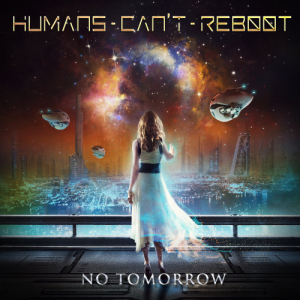Humans Can't Reboot - No Tomorrow
This review was commissioned through Ko-fi. However, it bears no weight on the score or decision. All reviews are written from an unbiased standpoint.
Simon Carter, the extravagant music producer whose best known for his industrial techno and darker beats, has taken it upon himself for the past several years to show off a futuristic, poppier side to himself with Humans Can’t Reboot. The solo producer tackles synthpop, futurepop, and the like with vocalist Amy Hannam transporting the listener into a digital future. Together, they’ve an impressive back catalog of three singles, two albums, and one EP. And they’re expanding that discography to include their brand-new album “No Tomorrow”, which so happens to be my first full dive into Humans Can’t Reboot. While it is a bit polarizing to me, it does shock me in a way I wasn’t expecting.
Starting off the review I would like to give my compliments outright to Amy Hannam, for if I don’t I would be mentioning her stellar performance every time I mentioned a track. But her voice and personality radiate into the stars and space above, creating a whole new galaxy with blazing stars to be admired. Taking a look at ‘Girl Not Machine’, she pours out a hopeful yet saddened monologue; ‘Broken Promise’ showcases heartbreak, a vent of frustration and what could’ve been; the title track beckons forth images of the here and the now, living in the present; whatever tone or story or general feeling Simon Carter portrays in the music Hannam is able to match wonderfully. And it’s a flawless performance.
Where Simon Carter blunders, however, is that a lot of what I’m hearing on the original mixes is extremely standard / generic for synthpop, futurepop, synthwave, or a mixture of all three. It’s to the point where I struggled to point out anything entirely awful or entirely great about the album; it’s an album where I can listen to it, bob my head to the beat, and say, “Yup, that’s electronic music.” But other than that, in terms of praise or criticism alike, I’m finding it hard to point out what’s entirely unique musically.
There are a couple of songs on the album that stand out to me, such as ‘Demons’. The opening synths are dreary and dreamy, and has a slow rolling beat that eventually turns into this romantic and powerful electronic ballad. Of course, that’s also due in part to Hannam’s voice, but either way it’s a gorgeous track. If the rest of these tracks were as succulent and as addicting as this one, as magical even, I would be in heaven. Unfortunately, that is not the case.
Fortunately, however, Simon Carter is not the type of producer who is able to create one version of a song and be satisfied. No, instead he either has the creative urge OR a creative curse to keep going. Nonetheless, due to his work-horse nature, Simon Carter has produced a double album; there are eleven original tracks and eleven club versions of those tracks. And I’ll be fucking damned if the club versions aren’t better than the original mixes.
It is as if Carter snorted a fat line of 90s Eurodance and injected it into the original mixes with modern production. All of a sudden, every single song sounds better and is that much more addicting. Take, for example, ‘Ghosts’, which is my least favorite song on ‘Humans Can’t Reboot’. The club version gives it a delicate touch of ambiance, a four on the floor beat, yet still retains the same energy and futurepop vibe as the original beat. Mix that with Hannam’s unaltered vocals and you’ve a hit. No matter which song you compare to (okay, except maybe ‘Demons’), it’s night and day. The only club version I disliked was with ‘Maybe It’s Time To Go’. Carter sped up Hannam’s vocals to fit the new rhythm and beat which was a mistake; it butchers her effort and makes it almost comical.
So, I usually prefer original songs over alternate mixes, but “No Tomorrow” is a rare example where the opposite is true. Carter’s BPM versions of the original songs are just smashing and I can’t really wait to dive back into them. Again, the original versions aren’t bad, per say, but it’s hard to really find something to praise. Hannam is the standout star of the album even after all is said, and Humans Can’t Reboot wouldn’t be the same without her. Overall, however, I have to take the album for what it is. I like it, I don’t love it, but I will be back for more in the near future. Seven out of ten.
Aug 30 2022
Off label
Official release released by the artist themselves without the backing of a label.

Steven Gullotta
info@brutalresonance.comI've been writing for Brutal Resonance since November of 2012 and now serve as the editor-in-chief. I love the dark electronic underground and usually have too much to listen to at once but I love it. I am also an editor at Aggressive Deprivation, a digital/physical magazine since March of 2016. I support the scene as much as I can from my humble laptop.
Share this review
Facebook
Twitter
Google+
Shares
Buy this release
Bandcamp
Aeverium - Break Out is available at POPONAUT from 13,95€
Related articles
Neonsol
Interview, Feb 18 2017
Twilight Transmissions vs. Void of Realms - 'Between Worlds, Beyond Shadows'
Review, Jun 14 2014
Karsten Hamre - 'Through Alien Eyes'
Review, Oct 18 2013
Anatomia De Vanitats - 'The Anthropic Principle'
Review, Nov 14 2013
Project K.1.1 - 'DRUGS'
Review, Apr 20 2014




